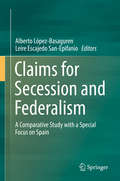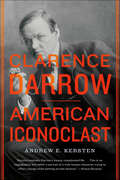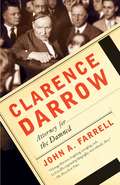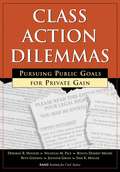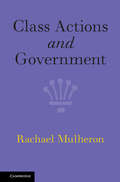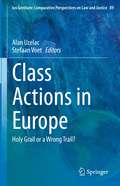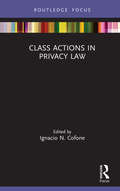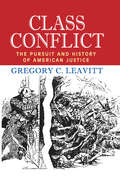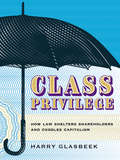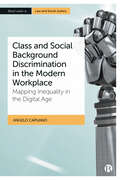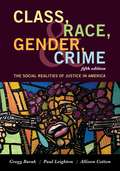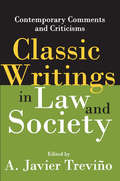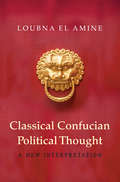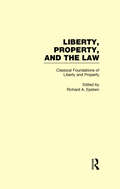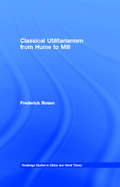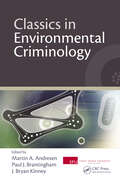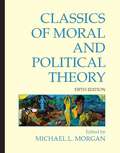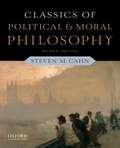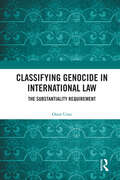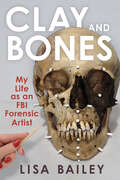- Table View
- List View
Claiming the Union
by Susanna Michele LeeThis book examines Southerners' claims to loyal citizenship in the reunited nation after the American Civil War. Southerners - male and female; elite and non-elite; white, black, and American Indian - disagreed with the federal government over the obligations citizens owed to their nation and the obligations the nation owed to its citizens. Susanna Michele Lee explores these clashes through the operations of the Southern Claims Commission, a federal body that rewarded compensation for wartime losses to Southerners who proved that they had been loyal citizens of the Union. Lee argues that Southerners forced the federal government to consider how white men who had not been soldiers and voters, and women and racial minorities who had not been allowed to serve in those capacities, could also qualify as loyal citizens. Postwar considerations of the former Confederacy potentially demanded a reconceptualization of citizenship that replaced exclusions by race and gender with inclusions according to loyalty.
Claims for Secession and Federalism: A Comparative Study with a Special Focus on Spain
by Alberto López-Basaguren Leire Escajedo San-EpifanioThis volume, incorporating the work of scholars from various parts of the globe, taps the wisdom of the Westphalian (and post-Westphalian) world on the use of federalism and secession as tools for managing regional conflicts. The debate has rarely been more important than it is right now, especially in light of recent events in Catalonia, Scotland, Québec and the Sudan - all unique political contexts raising similar questions about how best to balance competing claims for autonomy, interdependence, political voice, and exit. Exploring how various nations have encountered comparable conflicts, some more and some less successfully, the book broadens the perspectives of scholars, government officials, and citizens struggling to resolve sovereignty conflicts with a full appreciation of the underlying principles they represent.
Clarence Darrow: American Iconoclast
by Andrew E. KerstenClarence Darrow is best remembered for his individual cases, whether defending the thrill killers Leopold and Loeb or John Scopes's right to teach evolution in the classroom. In the first full-length biography of Darrow in decades, the historian Andrew E. Kersten narrates the complete life of America's most legendary lawyer and the struggle that defined it, the fight for the American traditions of individualism, freedom, and liberty in the face of the country's inexorable march toward modernity. Prior biographers have all sought to shoehorn Darrow, born in 1857, into a single political party or cause. But his politics do not define his career or enduring importance. Going well beyond the familiar story of the socially conscious lawyer and drawing upon new archival records, Kersten shows Darrow as early modernity's greatest iconoclast. What defined Darrow was his response to the rising interference by corporations and government in ordinary working Americans' lives: he zealously dedicated himself to smashing the structures and systems of social control everywhere he went. During a period of enormous transformations encompassing the Gilded Age and the Progressive Era, Darrow fought fiercely to preserve individual choice as an ever more corporate America sought to restrict it.
Clarence Darrow: Attorney for the Damned
by John A. FarrellDrawing on untapped archives and full of fresh revelations, here is the definitive biography of America's legendary defense attorney and progressive hero.Clarence Darrow is the lawyer every law school student dreams of being: on the side of right, loved by many women, played by Spencer Tracy in Inherit the Wind. His days-long closing arguments delivered without notes won miraculous reprieves for men doomed to hang. Darrow left a promising career as a railroad lawyer during the tumultuous Gilded Age in order to champion poor workers, blacks, and social and political outcasts against big business, Jim Crow, and corrupt officials. He became famous defending union leader Eugene Debs in the landmark Pullman Strike case and went from one headline case to the next--until he was nearly crushed by an indictment for bribing a jury. He redeemed himself in Dayton, Tennessee, defending schoolteacher John Scopes in the "Monkey Trial," cementing his place in history. Now, John A. Farrell draws on previously unpublished correspondence and memoirs to offer a candid account of Darrow's divorce, affairs, and disastrous finances; new details of his feud with his law partner, the famous poet Edgar Lee Masters; a shocking disclosure about one of his most controversial cases; and explosive revelations of shady tactics he used in his own trial for bribery. Clarence Darrow is a sweeping, surprising portrait of a legendary legal mind.From the Hardcover edition.
Clarity of Responsibility, Accountability, and Corruption
by Margit Tavits Schwindt-Bayer Leslie A.Corruption is a significant problem for democracies throughout the world. Even the most democratic countries constantly face the threat of corruption and the consequences of it at the polls. Why are some governments more corrupt than others, even after considering cultural, social, and political characteristics? In Clarity of Responsibility, Accountability, and Corruption, the authors argue that clarity of responsibility is critical for reducing corruption in democracies. The authors provide a number of empirical tests of this argument, including a cross-national time-series statistical analysis to show that the higher the level of clarity the lower the perceived corruption levels. Using survey and experimental data, the authors show that clarity causes voters to punish incumbents for corruption. Preliminary tests further indicate that elites respond to these electoral incentives and are more likely to combat corruption when clarity is high.
Class Action
by Catherine ArnoldWhile lawyer Karen Perry-Mondori investigates the murder of a homeless man, the victim's son casts doubt on the medical facts of the case and Karen finds herself faced off against a secretive research firm with possible government links.
Class Action Dilemmas: Pursuing Public Goals for Private Gain
by Deborah R. Hensler Jennifer Gross Bonnie Dombey-Moore Erik Moller Elizabeth GiddensClass action lawsuits--allowing one or a few plaintiffs to represent many who seek redress--have long been controversial. The current controversy, centered on lawsuits for money damages, is characterized by sharp disagreement among stakeholders about the kinds of suits being filed, whether plaintiffs' claims are meritorious, and whether resolutions to class actions are fair or socially desirable. Ultimately, these concerns lead many to wonder, Are class actions worth their costs to society and to business? Do they do more harm than good? To describe the landscape of current damage class action litigation, elucidate problems, and identify solutions, the RAND Institute for Civil Justice conducted a study using qualitative and quantitative research methods. The researchers concluded that the controversy over damage class actions has proven intractable because it implicates deeply held but sharply contested ideological views among stakeholders. Nevertheless, many of the political antagonists agree that class action practices merit improvement. The authors argue that both practices and outcomes could be substantially improved if more judges would supervise class action litigation more actively and scrutinize proposed settlements and fee awards more carefully. Educating and empowering judges to take more responsibility for case outcomes--and ensuring that they have the resources to do so--can help the civil justice system achieve a better balance between the public goals of class actions and the private interests that drive them.
Class Actions and Government
by Rachael MulheronThe relationship between class actions and government makes for a nuanced and fascinating study. Government sets the scene by implementing and designing the regime, by choosing whether to act as a seed-funder for the regime, and by deciding to what extent it should regulate the regime against worldwide classes being litigated on its doorstep. It can then become a key player in the litigation itself. Government may be a representative claimant bringing the action, or a class member, or a potential financial beneficiary. Most commonly of all, it may be a defendant, being sued under the very regime which it enacted into law. With numerous opt-out class action regimes around the common law world in place, and others on the horizon, the book takes a comparative perspective throughout, and concludes with a series of recommendations, drawn from that comparative analysis of government's intricate interplay with class actions.
Class Actions in Europe: Holy Grail or a Wrong Trail? (Ius Gentium: Comparative Perspectives on Law and Justice #89)
by Alan Uzelac Stefaan VoetNot so long ago, class actions were considered to be a textbook example of American exceptionalism; many of their main features were assumed to be incompatible with the culture of the civil law world. However, the tide is changing; while there are now trends in the USA toward limiting or excluding class actions, notorious cases like Dieselgate are moving more and more European jurisdictions to extend the reach of their judicial collective redress mechanisms. For many new fans of class actions, collective redress has become a Holy Grail of sorts, a miraculous tool that will rejuvenate national systems of civil justice and grant them unprecedented power. Still, while the introduction of various forms of representative action has virtually become a fashion, it is anything but certain that attempting to transplant American-style class action will be successful. European judicial structures and legal culture(s) are fundamentally different, which poses a considerable challenge. This book investigates whether class actions in Europe are indeed a Holy Grail or just another wrong turn in the continuing pursuit of just and effective means of protecting the rights of citizens and businesses. It presents both positive and critical perspectives, supplemented by case studies on the latest collectivization trends in Europe’s national civil justice systems. The book also shares the experiences of some non-European jurisdictions that have developed promising hybrid forms of collective redress, such as Canada, Brazil, China, and South Africa. In closing, a selection of topical international cases that raise interesting issues regarding the effectiveness of class actions in an international context are studied and discussed.
Class Actions in Privacy Law
by Ignacio N. CofoneClass actions in privacy law are rapidly growing as a legal vehicle for citizens around the world to hold corporations liable for privacy violations. Current and future developments in these class actions stand to shift the corporate liability landscape for companies that interact with people’s personal information. Privacy class actions are at the intersection of civil litigation, privacy law, and data protection. Developments in privacy class actions raise complex issues of substantive law as well as challenges to the established procedures governing class action litigation. Their outcomes are integral to the evolution of privacy law and data protection law across jurisdictions. This book brings together established scholars in privacy law, data protection law, and collective litigation to offer a detailed perspective on the present and future of collective litigation for privacy claims. Taking a comparative approach, this book incorporates considerations from consumer protection law, procedural law, cross-border litigation, tort law, and data protection law, which are key to understanding the development of privacy class actions. In doing so, it offers an analysis of the novel challenges they pose for courts, regulatory agencies, scholars, and litigators, together with their potential solutions.
Class Conflict: The Pursuit and History of American Justice
by Gregory C. LeavittIn a just society the law not only applies to all equally, but also arises from the consent of the people it embraces. As such, justice implies that people have access to governance. A just society provides and guards social and individual rights for all its members. The freedom of speech, therefore, is a right of all, and society has institutionalized processes to guarantee that freedom.Due to the American people's understanding of exclusion and rank, the meaning of justice was fragmented by social status and class. While this book views American justice through a prism of social-class conflict, Gregory C. Leavitt argues that it would be incorrect to portray this perspective as somehow whole. American justice is relative to many cultural groupings and conditions and is thus at the same distance from its encompassing ideal understood by common Americans.Beginning with the late eighteenth century and ending in the late twentieth century, Leavitt traces the history of class conflict and the struggle for justice among Americans. He argues that class struggles remain a significant factor in American social problems, because the American situation grew out of government promises of freedom and liberty to the lower class and the development of a powerful middle class. This is a provocative contribution to the debate over the future of social justice in America.
Class Privilege: How Law Shelters Shareholders and Coddles Capitalism
by Harry GlasbeekCapitalism’s agenda is the endless pursuit of private accumulation of socially produced wealth. In our system, the corporation—created by law—is meant to hide this agenda, to distract us so that flesh and blood capitalists can do what they like. But when the workings of the corporation are examined, they reveal a betrayal of the very values and norms that, for their legitimacy’s sake, capitalists in our parts of the world purport to share. Harry Glasbeek highlights one of capitalism’s weak spots–the perverting economic, political, and ethical roles played by the prime instrument of private wealth accumulation: the legal corporation. Once the corporate mask is ripped off, those who hide behind it become visible. Stripped of their protective garb, the capitalist class will be just as naked as the rest of us are when we face their corporations.
Class and Social Background Discrimination in the Modern Workplace: Mapping Inequality in the Digital Age
by Angelo CapuanoThis book exposes how inequalities based on class and social background arise from employment practices in the digital age. It considers instances where social media is used in recruitment to infiltrate private lives and hide job advertisements based on locality; where algorithms assess socio-economic data to filter candidates; where human interviewers are replaced by artificial intelligence with design that disadvantages users of classed language; and where already vulnerable groups become victims of digitalisation and remote work. The author examines whether these practices create risks of discrimination based on certain protected attributes, including ‘social origin’ in international labour law and laws in Australia and South Africa, ‘social condition’ and ‘family status’ in laws within Canada, and others. The book proposes essential law reform and improvements to workplace policy.
Class, Race, Gender, and Crime: The Social Realities of Justice in America
by Paul Leighton Gregg Barak Allison CottonClass, Race, Gender, and Crime is a popular, and provocative, introduction to crime and the criminal justice system through the lens of class, race, gender, and their intersections. The book systematically explores how the main sites of power and privilege in the United States consciously or unconsciously shape our understanding of crime and justice in society today. <P><P>The fifth edition maintains the overall structure of the fourth edition—including consistent headings in chapters for class, race, gender, and intersections—with updated examples, current data, and recent theoretical developments throughout. This new edition includes expanded discussions of police violence and the Black Lives Matter movement, immigration, and queer criminology.
Classic Writings in Law and Society: Contemporary Comments and Criticisms
by A. Javier TrevinoOver against such reference volumes as encyclopedias, which are intended to provide an overview and summary of a subject, and dictionaries, which define a series of terms, "commentaries" generally consist of a collection of lectures or essays that discuss and explain in some detail particular topics and sources. In law, the best known and oldest of these is William Blackstone's Commentaries on the Laws of England (1765-1769). Others, which are equally prominent, include James Kent's Commentaries on American Law (1826) and Joseph Story's Commentaries on the Constitution of the United States (1833). This volume is presented in the spirit of the aforementioned treatises. It consists of several essays of contemporary comments and criticisms intended generally to inform and educate.The commentaries in this book have two collective purposes. First and foremost, they are intended to acquaint a new generation of students with thirteen classic books written by diverse sociolegal scholars--ranging from Henry Sumner Maine, Oliver Wendell Holmes, Jr., and Hans Kelsen to Eugen Ehrlich, Nicholas S. Timasheff, and Richard Quinney. Second, they endeavor to demonstrate the contemporary theoretical relevance, the continuing legacy, of these classic writings. Accordingly, the commentaries discuss each of the scholars' work in general, how the particular book under consideration fits into that corpus, and how the book is assessed in a contemporary context. Singly and collectively these books have a clear relation to the "classic" tradition in thought--a tradition that, although not always acknowledged, is of great significance to current theorizing in law and society.The classic tradition represents those books that have come to be considered the foundational texts in the social scientific study of law. The commentaries collected here were written by some of today's leading scholars of law and society, including Piers Beirne, Dario Melossi, Kalus A. Zigert, Alan Hunt, Marshall B. Clinard, and Dragan Milovanovic.
Classical Confucian Political Thought
by Loubna El AmineThe intellectual legacy of Confucianism has loomed large in efforts to understand China's past, present, and future. While Confucian ethics has been thoroughly explored, the question remains: what exactly is Confucian political thought? Classical Confucian Political Thought returns to the classical texts of the Confucian tradition to answer this vital question. Showing how Confucian ethics and politics diverge, Loubna El Amine argues that Confucian political thought is not a direct application of Confucian moral philosophy. Instead, contrary to the conventional view that Confucian rule aims to instill virtue in all members of society, El Amine demonstrates that its main aim is to promote political order.El Amine analyzes key aspects of the Confucian political vision, including the relationship between the ruler and the people, the typology of rulers, and the role of ministers and government officials. She also looks at Confucianism's account of the mechanisms through which society is to be regulated, from welfare policies to rituals. She explains that the Confucian conception of the political leaves space open for the rule of those who are not virtuous if these rulers establish and maintain political order. She also contends that Confucians defend the duty to take part in government based on the benefits that such participation can bring to society.Classical Confucian Political Thought brings a new understanding to Confucian political theory by illustrating that it is not chiefly idealistic and centered on virtue, but rather realistic and driven by political concerns.
Classical Foundations of Liberty and Property: Liberty, Property, and the Law
by Richard A. EpsteinThe materials in this collection are drawn from many disciplines, including economics,law, philosophy and political science. Yet they are all directed to a topic that is worthy of examination from multiple perspectives: "Liberty, Property and the Law." Stated in this general form, this topic is as broad as law itself. The relationship of liberty andproperty to the law surfaces whenever and wherever people interact with each otherunder the command and control of the sovereign. Those who hold sovereign power may choose to protect liberty and property or to undermine it. But the regrettably high frequency of political abuse throughout the world does not justify the exercise ofarbitrary legal power; nor does it limit human aspirations for a sound legal and socialorder to block political excesses. First Published in 2000. Routledge is an imprint of Taylor & Francis, an informa company.
Classical Utilitarianism from Hume to Mill (Routledge Studies in Ethics and Moral Theory #Vol. 2)
by Frederick RosenThis book presents a new interpretation of the principle of utility in moral and political theory based on the writings of the classical utilitarians from Hume to J.S. Mill. Discussion of utility in writers such as Adam Smith, William Paley and Jeremy Bentham is included.
Classics in Environmental Criminology
by Martin A. Andresen J. Bryan Kinney Paul J. BrantinghamA careful analysis of environmental factors is key to understanding the causes of crime, to solving crimes, and eventually helping to predict and prevent them. Classics in Environmental Criminology is a comprehensive collection of seminal pieces from legendary contributors who focus on the role that the immediate environment plays in the occurrence
Classics of Criminology (Fourth Edition)
by Joseph E. Jacoby Theresa A. Severance Alan S. Bruce"This inclusive collection is organized into three sections, each of which opens with a brief editorial introduction to provide context. Section I, The Classic Descriptions of Crime, contains writings whose primary contribution is descriptive, although they also offer important theoretical insights. These works illuminate with great clarity certain aspects of the phenomenon of crime. Section II, Theories of Causation of Crime, covers over two centuries of theorizing about the causes of crime. Most of these writings are specifically about crime, although some emphasize larger social issues that have direct implications for criminology. Section III, The Social Response to Crime, includes writings that variously describe, theorize about, or advocate specific social responses to crime.
Classics of Moral and Political Theory
by Michael L. MorganThe fifth edition of Michael L. Morgan's Classics of Moral and Political Theory broadens the scope and increases the versatility of this landmark anthology by offering new selections from Aristotle's Politics, Aquinas' Disputed Questions on Virtue and Treatise on Law, as well as the entirety of Locke's Letter Concerning Toleration, Kant's To Perpetual Peace, and Nietzsche's On the Advantage and Disadvantage of History for Life.
Classics of Political and Moral Philosophy
by Steven M. CahnClassics of Political and Moral Philosophy provides in one volume the major writings from nearly 2,500 years of political and moral philosophy, from Plato through the twentieth century. The most comprehensive collection of its kind, it moves from classical thought (Plato, Aristotle, Epicurus,Cicero) through medieval views (Augustine, Aquinas) to modern perspectives (Machiavelli, Hobbes, Spinoza, Locke, Rousseau, Hume, Adam Smith, Kant). It includes major nineteenth-century thinkers (Bentham, Hegel, Mill) and considerably more twentieth-century theorists than are found in competingvolumes (Rawls, Nozick, Taylor, Foucault, Habermas, Held, Nussbaum). Also included are numerous essays from The Federalist Papers and a variety of notable documents and addresses, among them Pericles' Funeral Oration, The Declaration of Independence, The Constitution of the United States, The Declaration of the Rights of Man and of the Citizen, and speeches by EdmundBurke, Abraham Lincoln, Elizabeth Cady Stanton, John Dewey, and Martin Luther King, Jr. The readings are substantial or complete texts, not fragments. The second edition contains two new readings - by Charles Taylor and Virginia Held - and adds The Universal Declaration of Human Rights. It alsopresents two works by John Locke in their entirety and includes a new translation of Kant's Groundwork for the Metaphysics of Morals. An especially valuable feature of this volume is that the writings of each author are introduced with a substantive and engaging essay by a leading contemporary authority. These introductions include Richard Kraut on Plato, Aristotle, Epicurus, and Cicero; Paul J. Weithman on Augustine and Aquinas;Roger D. Masters on Machiavelli; Jean Hampton on Hobbes; Steven B. Smith on Spinoza and Hegel; A. John Simmons on Locke; Joshua Cohen on Rousseau and Rawls; Donald W. Livingston on Hume; Charles L. Griswold, Jr. , on Smith; Bernard E. Brown on Hamilton and Madison; Jeremy Waldron on Bentham and Mill;Paul Guyer on Kant; Richard Miller on Marx and Engels; Thomas Christiano on Nozick; Robert B. Talisse on Charles Taylor; Thomas A. McCarthy on Foucault and Habermas; Cheshire Calhoun on Held; and Eva Feder Kittay on Nussbaum. Offering unprecedented breadth of coverage, Classics of Political and Moral Philosophy, Second Edition, is an ideal text for courses in political philosophy, social and political philosophy, moral philosophy, or surveys in Western civilization.
Classified
by Christopher MoranClassified is a fascinating account of the British state's long obsession with secrecy and the ways it sought to prevent information about its secret activities from entering the public domain. Drawing on recently declassified documents, unpublished correspondence and exclusive interviews with key officials and journalists, Christopher Moran pays particular attention to the ways that the press and memoirs have been managed by politicians and spies. He argues that, by the 1960s, governments had become so concerned with their inability to keep secrets that they increasingly sought to offset damaging leaks with their own micro-managed publications. The book reveals new insights into seminal episodes in British post-war history, including the Suez crisis, the D-Notice Affair and the treachery of the Cambridge spies, identifying a new era of offensive information management, and putting the contemporary battle between secret-keepers, electronic media and digital whistle-blowers into long-term perspective.
Classifying Genocide in International Law: The Substantiality Requirement
by Onur UrazThis book offers an in-depth examination into genocide law by focusing on one of the lesser examined, yet practically significant, issues: the ‘substantiality requirement’. This refers to the requirement in international law that intended destruction should be directed towards a ‘substantial’ part of a protected group in order for an atrocity to qualify as genocide. This comprehensive and detailed study draws connections between different judicial approaches to ‘substantiality’ and the varying theoretical presumptions about the constitutive concepts of the crime. This prima facia doctrinal problem is used as a springboard to scrutinise the broader theoretical problems underlying the legal conceptualisation of genocide. The book systematically explores how the individualistic and collectivistic conceptions of the crime have been able to co-exist in case law and how the different approaches to assessing substantiality have played a backdoor role between these two conceptions. The work demonstrates that these two philosophical standpoints are far from effectively representing the reality of the protected groups and fully explaining the harm inherent to group destruction. The book revisits the recent philosophical and sociological studies on the crime and, considering ideas from the emerging ‘relational approaches to genocide’, offers a third way to understand the existing legal representation of the crime and, consequently, the idea of ‘substantiality’. It demonstrates the practical significance of its theoretical debates and applies its novel perspective through a case study on South Sudan. This book will be highly useful to students and scholars with an interest in genocide studies, international criminal law and legal theory. It will also be of interest to policymakers engaged with issues around genocide.
Clay and Bones: My Life as an FBI Forensic Artist
by Lisa G. BaileyTold with unflinching honesty and a touch of gallows humor,Clay and Bonesis the personal memoir of the first female forensic sculptor in the FBI. Lisa Bailey never considered a career working in death until she saw the FBI job posting for a forensic artist. The idea of using her artistic skill to help victims of crime was too compelling to pass up. Soon she was documenting crime scenes, photographing charred corpses, and digitally retouching the disembodied heads of suicide bombers. But it was facial approximation—sculpting a face from the remnants of an unidentified victim's skull—that intrigued her the most. Bailey knew that if she could capture that person's likeness in clay, she just might help them be identified, and that might help law enforcement track down their killer. Bailey worked on hundreds of cases and grew to become a subject matter expert in the field. It was the most challenging and fulfilling work she could have imagined, and she never thought of leaving. But her life changed when she became the target of sexual discrimination and harassment. She was stunned when FBI management protected the abusers and retaliated with threats, slander, and an arsenal of lawyers. Trapped in an increasingly hostile work environment, and infuriated at the hypocrisy of the FBI's tactics, Bailey decided to fight back.Clay and Bones is a memoir with a mission, and a fascinating exploration into the surreal and satisfying work of a forensic artist.

